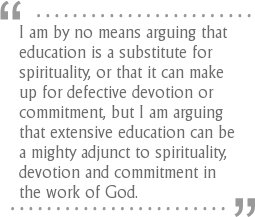"Leaders from 17 college campus ministries have signed an agreement aimed at keeping their work cooperative"
Body
Discussion
Texas Bill Would Protect College Professors Who Question Evolution
Body
Discussion
Court order: child must attend public school
Body
Discussion
UC Davis policy indicates American Christians are oppressors of non-Christians
Body
Discussion
Vanderbilt alters application after abortion clause protest
Body
Discussion
Becoming a True Christian Scholar: Some Recommendations, Part 1
 Reprinted with permission from As I See It. AISI is sent free to all who request it by writing to the editor at [email protected].
Reprinted with permission from As I See It. AISI is sent free to all who request it by writing to the editor at [email protected].
In run-of-the-mill conservative Christianity in general and Baptist Fundamentalism in particular there is, and has long been, an indigenous and deeply in-grained distrust and suspicion of highly educated men within our ranks. But this does not in the least reduce or detract from the great service and essential value such men have provided to Biblical Christianity through the centuries. If we may quote Erasmus (1466-1536) on Christianity’s debt to scholars:
Let it be remembered that the heretics were refuted by the scholars, and much more by the scholars than by the martyrs. By dying for a conviction a man proves only that he is sincere, not that he is right.1
In spite of this historic and continuing debt, there has been a parallel perverse distrust and contempt toward Christian scholars (even devout and spiritually-minded ones) by much of conservative evangelical Christianity. I recall well a conversation I was party to some 25 years and more ago with an independent, fundamental Baptist pastor—a man who himself had been unable to complete even a basic, un-demanding three-year Bible institute degree, a deficiency he had not remedied by extensive personal study in succeeding years—in which he told me that “I just don’t trust men with a lot of education.” As though abject ignorance somehow made a man more spiritual and useful to God!
John Gill (1697-1771) wrote a scathing rebuke of this absurd perspective nearly 250 years ago:
Here I cannot but observe the amazing ignorance and stupidity of some persons, who take it into their heads to decry learning and learned men; for what would they have done for a Bible, had it not been for them as instruments? and if they had it, so as to have been capable of reading it, God must have wrought a miracle for them; and continued that miracle in every nation, in every age, and to every individual; I mean the gift of tongues, in a supernatural way, as he bestowed upon the apostles on the day of Pentecost; which there is no reason in the world ever to have expected. Bless God, therefore, and be thankful that God has, in his providence, raised up such men to translate the Bible into the mother-tongue of every nation, and particularly ours; and that he still continues to raise up such who are able to defend the translations made, against erroneous persons, and enemies of the truth; and to correct and amend it in lesser matters, in which it may have failed, and clear and illustrate it by their learned notes upon it.2

Discussion